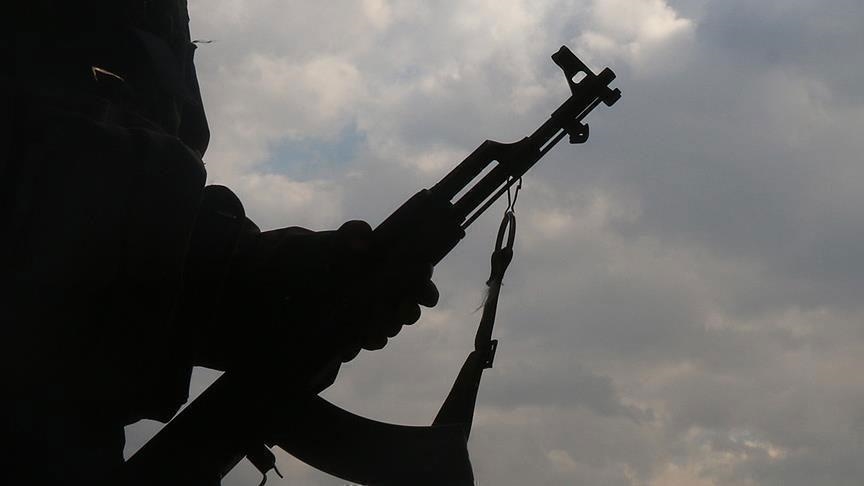PKK terrorists continue their presence in Sinjar, Iraq
They evacuate some points but this evacuation is just a ‘drama,’ says KDP’s Sinjar head

BAGHDAD
The PKK terror group continues their presence in Iraq’s Sinjar district center and on Mt. Sinjar in Mosul.
Under the auspices of the United Nations (UN), the Baghdad government and the Iraqi Kurdish Regional Government (KRG) signed an agreement in October to clear the region of the PKK terrorists.
Following that, the Iraqi central government sent two brigades of the federal police to Sinjar on Nov. 20.
Earlier this week, the central government officials announced that Iraqi forces have been deployed in Sinjar and all armed elements (PKK) have left Sinjar.
The KRG government declared its commitment to the Sinjar deal and said the removal of PKK in Sinjar is Baghdad's duty.
After these developments, attention turned to how much the situation in the field match the explanations.
Speaking to Anadolu Agency, Kadir Kacak, the Kurdistan Democratic Party’s (KDP) Sinjar district head, said that the presence of PKK terror group in Sinjar district center and on Mt, Sinjar continues.
Confirming that there are PKK in the center of Sinjar, Kacak said: "The large police station in Sinjar district center is still not evacuated, the unit they call the Sinjar Public Security Force is still there and they say they are against evacuation."
"They evacuated some points to show the UN, but this evacuation is just a drama and it is not true," Kacak said, adding that the terrorist group joined the Iraqi forces arriving in Sinjar.
Underlining that local militias affiliated with the PKK all have Hashd al-Shaabi identities and that they are also affiliated with Hashd al-Shaabi, he noted the Hashd al-Shaabi and the PKK should not stay in Sinjar in line with the agreement.
Pointing out that the terrorist organization continues to exist not only in the center of Sinjar, but also in Mount Sinjar, he said: "Some of them (PKK) change their clothes and wear civilian clothes. They hide themselves in this way. Some of them were sent to Mount Sinjar and its surroundings."
On Dec. 3, Tahsin Hafaji, the spokesman of Iraqi Joint Operations Command, told the National Iraqi News Agency that the federal police of the central government are present in the district and that the border guards are also deployed on the outskirts of the district at the Iraqi-Syrian border.
"All armed elements left Sinjar," the Iraqi spokesperson claimed and said they had negotiated with the PKK terrorist group.
"The central government and the Joint Operations Command have made great efforts in consultation with PKK-affiliated groups in preparing the grounds for the implementation of the agreement, pointing out that the Nineveh Operations Command is the one who manages the security file in Sinjar and other areas in the province," Hafaji said.
Also, on Dec.3, speaking to Anadolu Agency, Arshad al-Salihi, the head of the Iraqi Turkmen Front, said it is not clear where the terrorist elements will be sent after they are expelled from Sinjar as part of the agreement.
Stressing that the withdrawal signifies only a change of location, he said if the authorities implement a plan to place the terrorists in other parts of Iraq such as Makhmur, Qandil, Kirkuk or Tal Afar, the danger will become even greater.
“One of the biggest reasons for Iraq's bad relations with its neighbors is the presence of the PKK terrorist group in its territories,” he noted.
On Dec. 1, Iraqi security forces started to implement a deployment plan in the center of Sinjar district to enhance stability and security in the area that will enable displaced people to return home.
The Sinjar deal, inked under the auspices of the UN in October between the central government in Baghdad and the Kurdish Regional Government (KRG) on the status of the region, envisages clearing the region of the PKK terrorists.
The PKK terror organization managed to establish a foothold in Sinjar in 2014 under the pretext of protecting the Ezidi community from the Daesh/ISIS terror group.
Some 450,000 Ezidis fled Sinjar after Daesh/ISIS took control of the region.
In its more than 30-year terror campaign against Turkey, the PKK -- listed as a terrorist organization by Turkey, the US and the EU -- has been responsible for the deaths of 40,000 people, including women, children and infants.
*Writing by Seda Sevencan
Anadolu Agency website contains only a portion of the news stories offered to subscribers in the AA News Broadcasting System (HAS), and in summarized form. Please contact us for subscription options.







